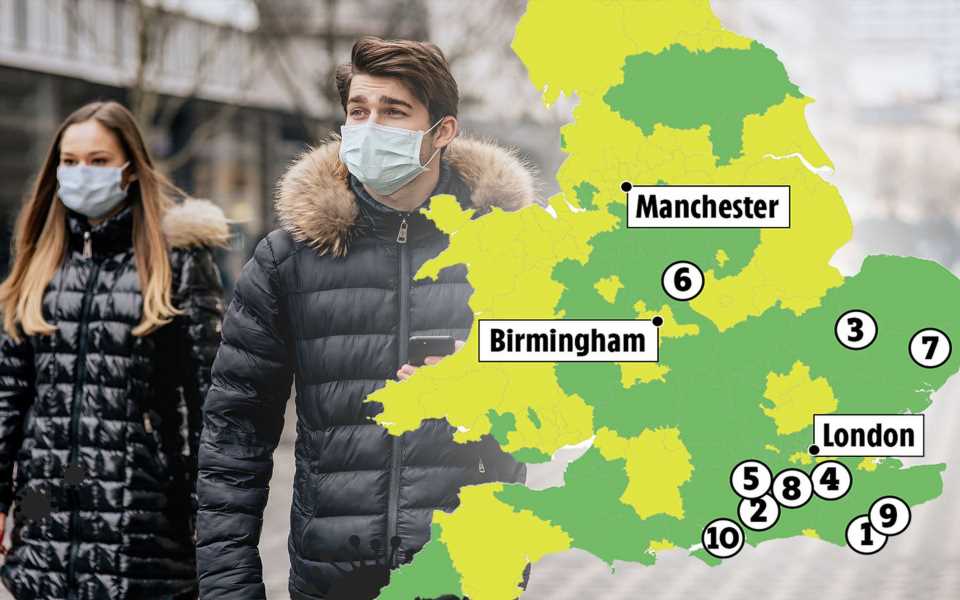COVID cases are rising thanks to a ‘devious’ new variant – and the nation’s hotspots have been revealed.
The World Health Organization has classified JN.1 as a “variant of interest” due to its “rapidly increasing spread”.

The bug has been reported across the world including in the US, Iceland, Portugal, Spain, China and France,
In the UK, it’s led to a 39 per cent increase in Covid infections in one week, just before Christmas.
It accounts for seven per cent of cases here, UKHSA says.
In the US, where the variant was first detected in September, it makes up between 15 and 29 per cent of cases, according to the estimates from Centers for Disease Control and Prevention.
Read more winter bugs
 TAKEN TOO SOON
TAKEN TOO SOON
‘Protect your babies’ begs dad as daughter, 9, dies days after catching flu
 FRESH THREAT
FRESH THREAT
'Devious' new Covid strain declared ‘variant of interest’ amid ‘rapid spread’
Prof Openshaw called the virus “devious”, telling the BBC: “I'm also hearing of people having nasty bouts of Covid, who are otherwise young and fit.
“It's a surprisingly devious virus, sometimes making people quite ill and occasionally leading to having 'long Covid'.”
Experts have been careful to stress the risk posed by the strain is currently "low".
But they have cautioned that as the coronavirus continues to evolve, the protection offered by vaccines administered in the years past becomes weaker.
Most read in Health
 TUMMY TROUBLES
TUMMY TROUBLES
What the location of your stomach ache means – plus how to fix it
 YOU BETTER WATCH OUT
YOU BETTER WATCH OUT
Warning over Christmas blinding risk as you enjoy festive tipple
 TRAGIC LOSS
TRAGIC LOSS
Two-month-old baby died in hospital after NHS medics fed her contaminated food
 DEADLY WATER
DEADLY WATER
Major NHS hospital admits its water is contaminated with killer bug
The vaccines still offer protection, the WHO says, and there is no evidence that it causes more severe disease.
Hotspots
According to the Government coronavirus dashboard, 6,000 Covid cases were diagnosed in England in the week to December 9 – the most recent data.
This equates to 10.6 cases for every 100,000 people in the region.
It’s a rise of almost 39 per cent from the week prior when there were 4,300 cases diagnosed or 7.6 cases per 100,000 people.
In Wales, 200 cases were reported in one week, equating to an infection rate of 6.4 per 100,000.
Looking at the UK in more granular detail, the seaside town of Hastings in East Sussex has the highest rate of cases.
It has 28.1 cases for every 100,000 people in the area, after 26 people were diagnosed in one week.
Following is Hart (27.7 per 100,000, 27 cases), South Cambridgeshire (26.1 per 100,000, 42 cases) and Tandridge (26 per 100,000, 23 cases).
The two places in England with no case numbers are Ribble Valley and Eden.
The latest UKHSA Winter Report warned that in the week to December 9, Covid positivity rates increased to 7.5 per cent in England for the week ending December 14, from 6.4 per cent the previous week.
Hospitalisations also increased slightly to 3.80 per 100,000 compared to 2.96 per 100,000 in the previous week.
Hospitalisations were highest in the 85 years and over age group – these people are still eligible to get a Covid booster jab.
Prof Peter Openshaw, from Imperial College London, previously told The Sun: "Immunity falls over time, and for many, it's been over a year since they had their last booster jabs."
He added: "The virus circulating now is quite different from the one we saw in 2020.
"The new virus has become so much better at transmitting from person to person, and it's likely only going to get better.
"It's also much better at evading the current immunity from infection and vaccination."
Prof Eleanor Riley, an immunologist at the University of Edinburgh, told the BBC: "People's antibody levels against Covid are probably as low now as they have been since the vaccine was first introduced."
JN.1 descended from BA.2.86 – the Pirola variant from Omicron.
Dr Amesh Adalja, a senior scholar at the Johns Hopkins Center for Health Security, has likened JN.1 to “another Omicron variant”.
What are the symptoms?
Unfortunately, regardless of how many vaccine doses you have had, there’s a good chance you will still get some Covid symptoms.
The symptoms of JN.1 appear to be similar to those caused by other strains, which include:
- Sore throat
- Congestion
- Runny nose
- Cough
- Fatigue
- Headache
- Muscle aches
- Fever or chills
- Loss of sense of taste or smell
Read more on The Sun
 end of journey
end of journey
Strictly in new 'feud' as THREE finalists all snub star after backstage row
 UNIMAGINABLE HEARTACHE
UNIMAGINABLE HEARTACHE
Baby girl dies suddenly after morning feed just days before Xmas
On ITV's This Morning, Dr Nighat Arif spoke of a potential change in symptoms with the Pirola variant.
She said: “So with the new variant, the Pirola variant, we know that not only do you get temperature, runny nose, a headache, we still have that loss of sense of smell, but you might actually get diarrhoea with it. Stomach cramps can also appear with the Pirola strain."
The current Covid hotspots
- Hastings 28.1
- Hart 27.7
- South Cambridgeshire 26.1
- Tandridge 26
- Rushmoor 24.4
- East Staffordshire 23.2
- South Norfolk 23.1
- Waverly 22.9
- Rother 21.7
- Gosport 21.3
Source: Read Full Article

